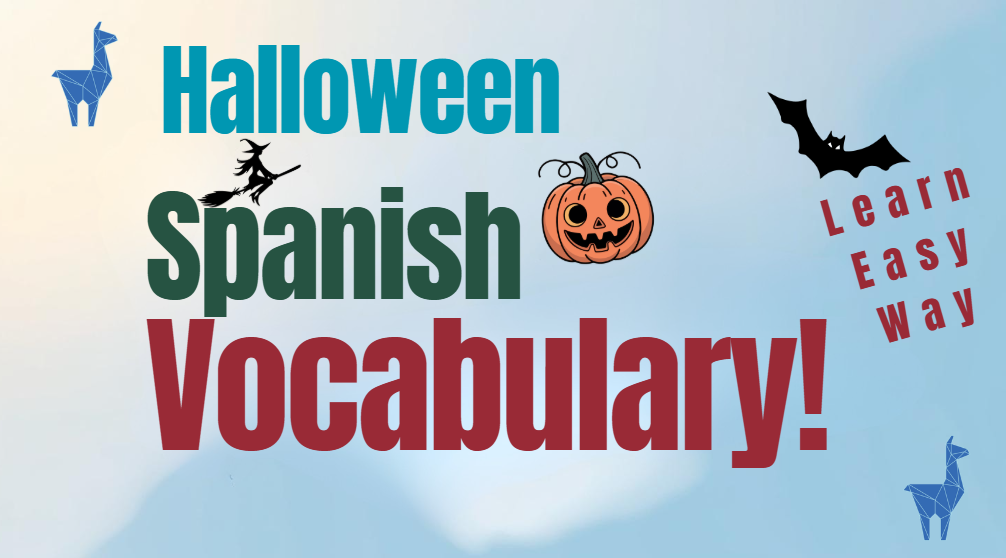Spanish Halloween Guide: Vocabulary, Expressions and More

Practice the vocabulary from this article with our Interactive Spanish Halloween Vocabulary Quiz Page !
As the autumn leaves fall and the nights grow longer, the spooky season offers a fantastic opportunity to expand your Spanish vocabulary while exploring fascinating cultural traditions.
With Halloween approaching, Spanish learners can discover how this holiday is celebrated across the Spanish-speaking world while building their language skills. From Mexico’s Día de los Muertos to Spain’s own Samaín festival, Halloween provides a rich context for learning new vocabulary, expressions, and grammatical structures.
In this comprehensive guide, you’ll master essential Spanish Halloween terms, understand regional variations in celebrations, and learn to discuss spooky topics with confidence.
Essential Spanish Halloween Vocabulary
Build your foundational vocabulary with these essential Halloween terms in Spanish:
| English Term | Spanish Translation | Example Sentence in Spanish |
|---|---|---|
| Halloween | Noche de Brujas / Halloween | Vamos a una fiesta de Noche de Brujas. |
| Pumpkin | La calabaza | Voy a tallar una calabaza para Halloween. |
| Costume | El disfraz | Mi disfraz de fantasma está listo. |
| Candy/Sweets | Los caramelos / Los dulces | Los niños piden dulces en Halloween. |
| Witch | La bruja | La bruja vuela en su escoba. |
| Skeleton | El esqueleto / La calavera | El esqueleto da miedo. |
| Ghost | El fantasma | El fantasma vive en la casa embrujada. |
| Trick or treat | ¡Truco o trato! | Los niños gritan “¡Truco o trato!“ |
| To dress up | Disfrazarse | Me gusta disfrazarme para Halloween. |
| To scare | Asustar / Espantar | Esa película va a asustar a los niños. |
| Cemetery | El cementerio | Decoraron la casa como un cementerio. |
Costume and Character Vocabulary
- Vampire – El vampiro
- Werewolf – El hombre lobo
- Zombie – El zombi
- Mummy – La momia
- Black cat – El gato negro
- Wizard – El mago / El hechicero
- Monster – El monstruo
- Devil – El diablo
Halloween Decorations and Objects
- Spider – La araña
- Spider web – La telaraña
- Bat – El murciélago
- Haunted house – La casa embrujada
- Broom – La escoba
- Coffin – El ataúd
- Skull – La calavera
- Jack-o-lantern – La linterna de calabaza / La calabaza de Halloween
Halloween Traditions Across the Spanish-Speaking World
Spain’s Unique Celebrations
In Spain, Halloween has blended with existing traditions to create unique regional celebrations:
- Galicia’s Samaín: In northwest Spain, the Celtic festival of Samaín features pumpkin carving, bonfires, and costume parties. Locals drink “queimada,” a potent alcoholic beverage prepared in a pumpkin while reciting spells for protection.
- All Saints’ Day: November 1st (Día de Todos los Santos) is a national holiday where families visit cemeteries to honor deceased loved ones, decorating graves with flowers and candles.
- Traditional Foods: Spaniards enjoy special sweets like “Huesos de Santo” (Saint’s Bones) – marzipan pastries shaped like bones – and “Buñuelos de Viento” (wind fritters) during this season.
- Modern Celebrations: Major cities like Madrid and Barcelona host extravagant costume parties, parades, and horror film festivals, particularly popular among younger generations.
Latin American Variations
Throughout Latin America, Halloween traditions reflect a blend of indigenous and Spanish influences:
- Mexico’s Día de los Muertos: Far from being a Spanish version of Halloween, this ancestral tradition on November 2nd honors deceased loved ones with colorful altars (ofrendas) decorated with marigolds, photos, candles, and favorite foods of the departed.
- Colombia’s Family Focus: In Bogotá, Halloween is more of a family affair where entire families dress up and visit malls together rather than going door-to-door.
- Chile’s Public Celebrations: Chilean children gather in public squares to ask for sweets from people passing by, creating vibrant community gatherings.
- Peru’s Purple Color Scheme: Unlike the traditional orange and black, purple is Peru’s distinctive Halloween color, worn prominently throughout October.
Useful Spanish Expressions Related to Halloween
These spooky Spanish expressions are used year-round in various contexts:
- ¡Feliz Halloween! – Happy Halloween!
- Estar en los huesos – Literally “to be in the bones,” meaning to be very thin or skin and bones
- Poner la piel de gallina – To get goosebumps (literally “to make chicken skin”)
- Morirse de miedo/risa/hambre – To be dying of fear/laughter/hunger
- Ser una tumba – To be a grave, meaning someone who can keep secrets well
- Costar un ojo de la cara – To cost an eye from your face (equivalent to “cost an arm and a leg”)
- Andar como zombie – To walk around like a zombie, used when someone is very tired
- Calabaza, calabaza, cada uno a su casa – A Chilean expression meaning “it’s time to go home,” used when an event is over
Grammar Tips for Halloween Vocabulary
Gender and Plural Forms
Remember that Spanish nouns have grammatical gender, which affects accompanying articles and adjectives:
- Masculine nouns: el fantasma, el disfraz, el cementerio
- Feminine nouns: la bruja, la calabaza, la tumba
- Plural forms: el disfraz → los disfraces, la bruja → las brujas, el fantasma → los fantasmas
Reflexive Verbs for Halloween Activities
- Disfrazarse (to dress up): Me disfrazo de vampiro. (I dress up as a vampire.)
- Asustarse (to get scared): Los niños se asustan con las películas de terror. (The children get scared with horror movies.)
Useful Verb Conjugations for Halloween
Practice these essential Halloween verbs using our Spanish Verb Conjugation Tool:
- Gritar (to scream): yo grito, tú gritas, él/ella grita
- Decorar (to decorate): yo decoro, tú decoras, él/ella decora
- Pedir (to ask for): yo pido, tú pides, él/ella pide
- Asustar (to scare): yo asusto, tú asustas, él/ella asusta
- Disfrazarse (to dress up): me disfrazo, te disfrazas, se disfraza
Need help with these conjugations? Use our Spanish Verb Conjugation Tool to practice any verb in all tenses!
Practice Exercise: Halloween Sentence Translation
Try translating these sentences into Spanish (answers below):
- The black cat is under the witch’s broom.
- We are going to carve a pumpkin for Halloween.
- The children shout “trick or treat!” at each house.
- I want to dress up as a zombie.
- That haunted house gives me goosebumps.
Answers:
- El gato negro está bajo la escoba de la bruja.
- Vamos a tallar una calabaza para Halloween.
- Los niños gritan “¡truco o trato!” en cada casa.
- Quiero disfrazarme de zombi.
- Esa casa embrujada me pone la piel de gallina.
Test Your Knowledge!
Ready to practice what you’ve learned? Visit our Halloween Quiz Page to test your knowledge of these Spanish Halloween terms and expressions through interactive exercises and games!
Conclusion: Expand Your Spanish This Halloween
Halloween provides a fun and engaging context for expanding your Spanish vocabulary and understanding of different cultures. Whether you’re discussing plans for Noche de Brujas, learning about Día de los Muertos, or trying to describe your favorite spooky movie, these terms and expressions will help you communicate more effectively in Spanish.
Don’t forget to practice with our Spanish Verb Conjugation Tool and check out our Interactive Halloween Quiz Page to master this vocabulary!
Continue building your seasonal vocabulary with our articles on Spanish Christmas terms and summer vacation vocabulary.



